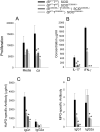B effector cells in rheumatoid arthritis and experimental arthritis
- PMID: 22432771
- PMCID: PMC3638788
- DOI: 10.3109/08916934.2012.665526
B effector cells in rheumatoid arthritis and experimental arthritis
Abstract
Rheumatoid arthritis is a chronic autoimmune immune disease affecting approximately 1% of the population. There has been a renewed interest in the role of B cells in rheumatoid arthritis based on the evidence that B cell depletion therapy is effective in the treatment of disease. This review summarizes the current knowledge of the mechanisms by which B cells contribute to autoimmune arthritis including roles as autoantibody producing cells, antigen-presenting cells, cytokine producing cells, and regulatory cells.
Conflict of interest statement
Figures



References
-
- Edwards JC, Cambridge G. Sustained improvement in rheumatoid arthritis following a protocol designed to deplete B lymphocytes. Rheumatology (Oxford) 2001;40(2):205–11. - PubMed
-
- Wardemann H, Yurasov S, Schaefer A, et al. Predominant autoantibody production by early human B cell precursors. Science. 2003;301(5638):1374–7. - PubMed
-
- Goodnow CC, Crosbie J, Adelstein S, et al. Altered immunoglobulin expression and functional silencing of self-reactive B lymphocytes in transgenic mice. Nature. 1988;334(6184):676–82. - PubMed
-
- Nemazee DA, Burki K. Clonal deletion of B lymphocytes in a transgenic mouse bearing anti-MHC class I antibody genes. Nature. 1989;337(6207):562–6. - PubMed
Publication types
MeSH terms
Substances
Grants and funding
LinkOut - more resources
Full Text Sources
Medical
